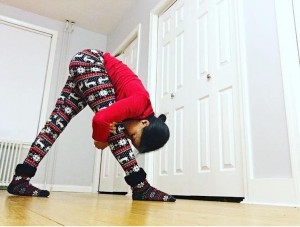 When dystonia dares to once again rear its twisted head after an extended remission of all but the most benign symptoms, it can sometimes feel like a personal failing on my healing journey. I chastise myself for the lapses in judgment that led to making unwise choices. I berate myself for knowing better than to behave in such foolish ways:
When dystonia dares to once again rear its twisted head after an extended remission of all but the most benign symptoms, it can sometimes feel like a personal failing on my healing journey. I chastise myself for the lapses in judgment that led to making unwise choices. I berate myself for knowing better than to behave in such foolish ways:
I shouldn’t have had a cheat day (or three) of so many carbs and processed foods.
I shouldn’t have had *any* alcohol to drink, much less two nights in a row.
I should have insisted on going to bed much earlier.
I shouldn’t have tried to do all that cleaning, writing and playing music in one (too hot) day.
I should have better protected myself from the sun.
Why did I skip yoga the last two days? Why did I do too much of it today?
There are a myriad of ways to recriminate myself for less healthy choices that may have triggered the latest dystonia storm. However, I know that what I need most during these challenging health days is to be the best cheerleader for myself, not my worst critic. I need less self-chastisement and indulgences in self-defeat and more self-love and moments of self-empowerment.
Consciously Choosing Healing Actions During a Dystonia Storm
 When my body is in turmoil and my morale takes a hit, feeding on negativity only makes matters worse. Focusing on the less desirable behaviors that I committed in the past that contributed to the discomfort in the present only keeps me stuck in negative feedback loop: I already wrecked my diet, and I feel too crappy to cook; we might as well have takeout again tonight. If, instead, I concentrate on how I can more consciously choose behaviors here and now that will mindfully move me forward, there’s a far greater chance that my rough days are numbered and remission will return once again. I was at the party too late last night to do my nightly yoga, and I feel too fatigued and in pain to do anything useful today. I will declare this a nurturing recover day…and if I just get on the mat for a brief, gentle flow right now, I’ll likely repair some of the musculoskeletal damage I did during the sleep-deprived night, and I’ll feel a bit better. If we look at ourselves the same way a loving parent might a child, doesn’t it make far more sense to encourage, praise and reward the positive choices that we make than to rebuke, penalize and make ourselves feel terrible any time that we slip up?
When my body is in turmoil and my morale takes a hit, feeding on negativity only makes matters worse. Focusing on the less desirable behaviors that I committed in the past that contributed to the discomfort in the present only keeps me stuck in negative feedback loop: I already wrecked my diet, and I feel too crappy to cook; we might as well have takeout again tonight. If, instead, I concentrate on how I can more consciously choose behaviors here and now that will mindfully move me forward, there’s a far greater chance that my rough days are numbered and remission will return once again. I was at the party too late last night to do my nightly yoga, and I feel too fatigued and in pain to do anything useful today. I will declare this a nurturing recover day…and if I just get on the mat for a brief, gentle flow right now, I’ll likely repair some of the musculoskeletal damage I did during the sleep-deprived night, and I’ll feel a bit better. If we look at ourselves the same way a loving parent might a child, doesn’t it make far more sense to encourage, praise and reward the positive choices that we make than to rebuke, penalize and make ourselves feel terrible any time that we slip up?
Having perspective during these especially challenging periods is also key. A relapse can truly be a terrifying and painful experience. It is easy to start worrying how long these rough days will last. Yet I remind myself to take deep breaths and repeat the following mantra to myself frequently until I remember its truth: This storm too shall pass. It really doesn’t matter when it will pass, in the grand scheme of things. The truth is that it will. I can’t fully control how long the storm will last or how much time will pass until the next one. What I can control is whether I will be defeated by the storm or whether I will hold steady through the thunder and lightning, through the howling winds and heavy downpours.
Do I just succumb to the disruption and potential destruction, or do I whip out my umbrella and raincoat? Do I just lay on the couch in a tense ball with a bag of peanut M&Ms beside me, dully binge-watching brain candy on Netflix? I believe I better serve my mind, body and soul to remember to drink plenty of water and eat healthy fats, to deeply breathe and meditate, to stretch gently after some heat therapy, to do short but more frequent rounds of restorative yoga and self-massage, and to read, watch or listen to something that lifts the spirits and inspires. Every little step we can take in the healing direction lessens the brutal effects of the storm.
Healing As Ongoing Journey, Not A Final Destination
 I used to think that healing was a harrowing, self-sacrificing journey you took through the countless storms of illness, which culminated in that ultimate endpoint: a cure–a miraculous elimination of symptoms. I think so many of us envision healing as the path to this final destination; a sort of one-stop magical shop you finally earn entry to when you’ve learned all the lessons illness has to teach you and after you’ve done all the difficult work of enduring dis-ease. Inside this shop, there’s a formula for healing your specific health conditions. Once you collect all the correct ingredients for this formula, you work the spell in its proper sequence, and then, poof, you’re cured. You never have to revisit those traumatic experiences again. I mean, that’s what we not-so-secretly hope for when we visit specialist after specialist, right?
I used to think that healing was a harrowing, self-sacrificing journey you took through the countless storms of illness, which culminated in that ultimate endpoint: a cure–a miraculous elimination of symptoms. I think so many of us envision healing as the path to this final destination; a sort of one-stop magical shop you finally earn entry to when you’ve learned all the lessons illness has to teach you and after you’ve done all the difficult work of enduring dis-ease. Inside this shop, there’s a formula for healing your specific health conditions. Once you collect all the correct ingredients for this formula, you work the spell in its proper sequence, and then, poof, you’re cured. You never have to revisit those traumatic experiences again. I mean, that’s what we not-so-secretly hope for when we visit specialist after specialist, right?
Yet I think we put far too much pressure on ourselves (and our support system, including our healthcare providers) when we think of healing simply in terms of destination. In reality, healing is a continuous pilgrimage that involves fully acknowledging and embodying our own experiences, pausing long enough and often enough to listen for what our body specifically needs, and then repeatedly engaging in healthy behaviors and nurturing self-care practices, accordingly. Healing is a never-ending journey of exploring, embodying and educating the body, mind and soul. What may work this month may not work next month, and what might not have done anything beneficial for us last year might provide the best relief this year. If we do reach a state of remission, for lack of a better word, then we want to keep doing the work of nurturing the body-mind-soul to ward off a relapse. We want to work at not only managing current conditions, but also dedicating ourselves to laying the life-sustaining foundation for preventing future dis-ease.
The healing journey is not without its rises and dips, its ebbs and flows, its clear paths and its obstacles. It is self-defeating to expect our passage to be perfect, predictable and purely “fair winds calm seas”. We can make the better choices every day for several weeks, months or even years, but then we have a huge crisis or a period of extreme stress, and we might have a cheat day (or week) or relapse with other self-defeating habits. I think we do ourselves a disservice when we view these falls off the wagon as failures, when we negate all the progress and successes that came before. The more we berate and punish ourselves, the less likely we’re going to provide an environment of love, encouragement and support we need to keep moving forward on the journey.
Positively Reframing the Self-Talk During Dystonia Relapses
 Reframing the self-talk regarding our health and lifestyle choices is so critical to our mindset and the physical manifestations of how we think and feel throughout the healing journey. Acknowledging when we consciously and thoughtfully choose healthier foods because it allows us to feel better–i.e., have more energy, less pain, improved contain and immune function–is much more of an empowering stance than the notions of self-defeat and resignation that underly phrases like, “I have to give up eating this,” or “I can’t eat that.” Likewise, when your mobility is hampered by illness, can you really not exercise anymore, or have you actually not yet found the modality or modifications within a type of exercise that work best for you? This is the perfect time to explore and try new things to see what might be an even better fit for you presently! And when you are able to exercise, instead of viewing it as a punishing chore you just must endure, it feels more invigorating and empowering to view it as an opportunity to consciously move your body with the aim of greater ease, from an attitude of gratitude and grace.
Reframing the self-talk regarding our health and lifestyle choices is so critical to our mindset and the physical manifestations of how we think and feel throughout the healing journey. Acknowledging when we consciously and thoughtfully choose healthier foods because it allows us to feel better–i.e., have more energy, less pain, improved contain and immune function–is much more of an empowering stance than the notions of self-defeat and resignation that underly phrases like, “I have to give up eating this,” or “I can’t eat that.” Likewise, when your mobility is hampered by illness, can you really not exercise anymore, or have you actually not yet found the modality or modifications within a type of exercise that work best for you? This is the perfect time to explore and try new things to see what might be an even better fit for you presently! And when you are able to exercise, instead of viewing it as a punishing chore you just must endure, it feels more invigorating and empowering to view it as an opportunity to consciously move your body with the aim of greater ease, from an attitude of gratitude and grace.
I think the greatest recipe for healing is when we begin to claim behaviors that ease our journey, benefitting us holistically. I think we feel much better about ourselves and our choices when we acknowledge and appreciate our willingness to seek out and take advantage of the opportunities we have to improve our wellbeing. Inherit in this state of greater ease is learning to fully forgive ourselves when we falter and being willing to start again from wherever we are now with the determination to keep moving forward. Instead of beating ourselves up and indulging in self-loathing, recognizing when we fall short of the mark thus becomes an opportunity for growth and reassessment of what works best for us at a particular point in time. It is an excellent time to consider whether alternative practices and approaches might be integrated into our regular wellness practices during this recovery period to better aid us in literally getting back on our feet once more.
Thanks for this, I am reading it as I am home from work sick , living through the same self blaming behavior you describe,
I’m so sorry you’re living through this too, but I am glad also that you can relate. The more we can connect with others going through similar experiences, the less we feel alone and the more equipped we are to handle what lies ahead. I think we all do the best we can with the circumstances we face. As I wrote in the post, it’s a continuous journey. There’s no real manual for how to deal with chronic illness, and we learn as we go. Hopefully, we pay enough attention to the signals our brain and body send us that we can be fully present and attentive and self-nurturing, leaving little room for self-blame.
It’s definitely a balance between taking good care of ourselves through the journey and living our lives to the fullest we’re able. Being able to forgive one’s self when we slip up now and then is so crucial to the healing process. We literally bear the burdens of shame and guilt in our bodies. It’s far better for us emotionally and physically to look ahead to how we can be kinder to ourselves, in all ways–body, mind and spirit. I’d even going so far as to say that learning how to truly love and care for ourselves is THE key to the healing path.